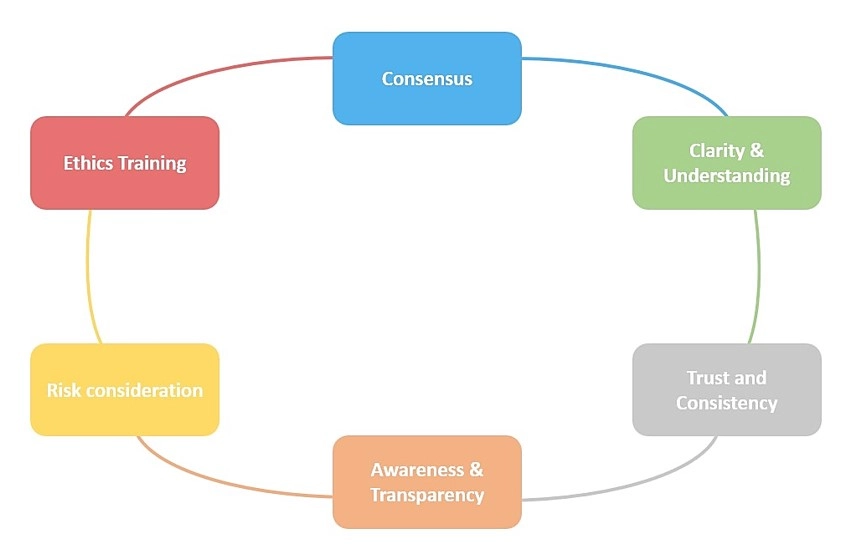Ethics is a crucial aspect of life, and similar to its application in our daily lives, ethical considerations should also apply in the tech world.
Disruptive technologies such as AI, ML, Internet of Things (IoT), computer vision, etc., require all sorts of data to operate. This data often includes biometric data, such as facial images and voice recordings. Collecting and managing such data requires various ethical and legal considerations, which, if disregarded, can lead to expensive lawsuits.
See data collection ethics and legal practices that can be considered while sourcing/gathering data to develop and deploy data-hungry AI/ML solutions.
How to achieve data collection ethics? (Best practices)
Extensive research has been done on data collection ethics and how to achieve it; however, there is no golden door to the land of absoluteness. Ethics is more of a process and a culture that needs to be adopted by all contributors (data collectors, developers, decision-makers, sales, marketing, executives, etc.) in developing and implementing an AI/ML solution.
Specifically for data collectors, this section highlights some best practices they can follow:

Ethics training
Providing sufficient training about data collection ethics can be beneficial in promoting and adopting the culture. A best practice to ensure the instructions are heeded is using an ethics checklist that the staff should tick off whenever they collect data.
You can also check our data-driven list of data collection/harvesting services to find the option that best suits your business needs.
Consent
Obtaining consent is one of the most critical parts of data collection ethics. This is part of the agreement between the data owner and the collector, and should be done. Before the data is collected, for instance, if a smart home device gathers voice data from its user, there should be a notification while setting up the app, giving the user the option to provide consent.
Clarity and understanding
This means that when collectors require user consent, their request should be clearly stated in easily understandable words. The data collectors should ensure that the user fully understands what he/she is permitting.
Trust and consistency
This means ethical and security practices while collecting data should be consistent to build trust in the data provider. For instance, if there are 500 data providers, then all 500 of them should be subjected to equal ethical considerations.
Awareness and Transparency
The data collection process should be transparent. The data provider should know what data is being collected, who will have access to it, and how it will be used.
Additionally, data providers should have control over how their data is used. For instance, if the data provider wants to stop using and sharing data in the future, he/she should be able to opt out easily.
Risk consideration
Another critical point to consider is that the risk of problems occurring in the future can never be eliminated. Therefore, the data collection must assess the risk of such unforeseen events and prepare a mitigation plan. Additionally, the data collector should communicate this risk to the data provider.

History of Major Data Collection Lawsuits (Case studies)
Unethical facial recognition data collection
The Washington Post reported that the U.S. immigration and Customs Enforcement authority unconstitutionally collected facial image data to track the activities of immigrants.
Watch the video to see how JFK airport only gathers facial images of foreigners.
To learn more about facial recognition, check out this quick read.
Voice data collection by smart home devices
Similarly, brands that offer smart home devices have also been under scrutiny for unethically collecting voice (biometric) data from their users.
For instance, Alexa was under a lawsuit for collecting user voice data without consent. A collaborative study by researchers from the University of Washington and three other institutions found this, leading to the lawsuit.
Watch this video to see how smart home devices gather user data:
Latest Regulations of Data Collection and Protection
| Regulation | Jurisdiction | Enacted | Scope | Key Requirements |
|---|---|---|---|---|
| CCPA & CPRA | California, USA | 2020 | Personal information of residents | Right to opt out of sale, deletion request handling, privacy notice update |
| Data Security Law & Cybersecurity Law | China | 2021/2017 | Data localization, critical infrastructure | Data localization, security assessments for “important data,” network operator obligations |
| PIPL | China | 2021 | Personal information of Chinese citizens | Explicit consent, DPIA for critical data, cross‑border transfer approvals |
| GDPR | EU | 2018 | All personal data | Consent, DPIA, breach notification within 72 hrs, data subject rights |
| UK Data Protection Act 2018 | UK | 2018 | Mirrors GDPR | Data protection principles, UK‑specific derogations, ICO enforcement powers |
| GINA | USA | 2008 | Genetic data | Prohibits use by insurers/employers, requires written consent |
| COPPA | USA | 1998 | Data of children under 13 | Parental consent, clear privacy policy, data minimization |
- Europe’s General Data Protection Regulation (GDPR) gives people the right to delete their data from the systems where it was uploaded.
- The Children’s Online Privacy Protection Act (COPPA) is in place in the U.S. to protect children’s data. It includes the dos and don’ts of gathering and using children’s data, such as when to take consent from the guardian, where not to use the data, etc.
- The Genetic Information Nondiscrimination Act (GINA) in the U.S. protects people’s genetic data from being used by insurance companies, hospitals, and other organizations that might exploit it.
- The Federal Trade Commission Act (FTC) in the U.S. also protects consumer data.
- The Data Protection Act 2018 is the UK’s version of the GDPR.
- Data governance in China is regulated by 3 main laws:
Further reading
- Quick Guide to Data Collection Quality Assurance
- Quick Guide to Data Collection/Harvesting/Sourcing
- Crowdsourced AI Data Collection Benefits & Best Practices
If you need help finding a vendor or have any questions, feel free to contact us:


Comments
Your email address will not be published. All fields are required.